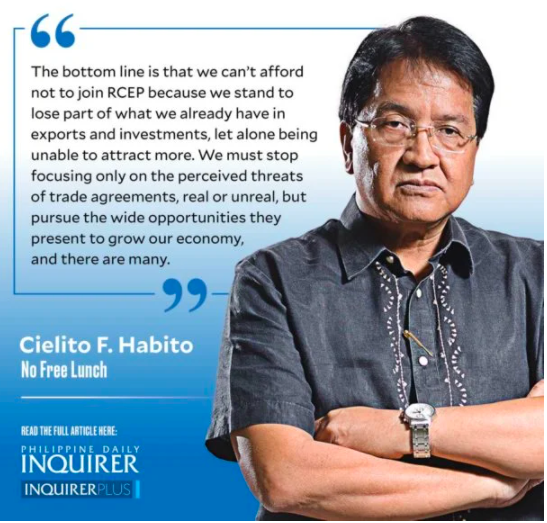Nurturing vs protecting
Many well-meaning people think that we should go slow or even retreat in joining the Regional Comprehensive Economic Partnership (RCEP), the world’s largest-ever economic bloc. Let me explain why not joining RCEP, and not joining now, is a bad idea. It would be like shooting ourselves in the foot, inflicting on us needless self-harm.
How would it hurt us to stay out of RCEP, now or in the future?
It’s important to note at the outset that RCEP’s members account for nearly two-thirds (64 percent) of our total exports, so opting out of that club would truly be costly to us. Reduction or elimination of our sales to (and purchases from) these trading partners means a hefty drop in our trade and foreign exchange inflows. Basic economic and business logic tells us that RCEP members will prefer to buy from fellow members to take advantage of free or preferential trade concessions. This means that if we opt out, they would look to other fellow RCEP members who produce the same things we do, as it would be costlier to buy from us without the concessions. We’re talking of our biggest export markets like China, Japan, Korea, and the rest of Asean, which as a bloc accounts for the single largest share (16.3 percent) of our exports. The reality is, our top exports like electronics, garments, chemicals, and farm exports like pineapple and banana could be readily sourced from our Asean neighbors already in RCEP. This impending scenario is known in the textbooks as the trade diversion effect of a free trade agreement, and as nonmember, we would be on the losing end. Are we prepared to face that loss?
For the same reason, investors eyeing the large RCEP market will choose to locate in an RCEP member country to enjoy concessional access to the rest of the members’ markets. If we’re out, we would simply be bypassed — even more than we already have been. Worse, companies already here exporting to RCEP countries will be pushed to shift operations to RCEP member countries. This very real prospect was already observed around 2015 when the Trans-Pacific Partnership (TPP) spanning 11 countries on both sides of the Pacific was on its final negotiations. Because we were not in it, we heard from foreign chambers then that some of their members were already making plans to leave and move operations to Vietnam or Malaysia, which were TPP members. What saved the day for us was US President Donald Trump’s decision to pull out of the pact, drastically diminishing the size of the TPP’s aggregate market, and reducing its attractiveness. The 10 remaining members went on anyway and formed the scaled-down CPTPP (Comprehensive and Progressive Agreement for TPP), even as their main original impetus for joining was to gain preferential access to the vast US market.
The bottom line is that we can’t afford not to join RCEP because we stand to lose part of what we already have in exports and investments, let alone being unable to attract more. As member, we can at least preserve what we have, and with the right government moves to raise our farms’ and firms’ productivity and competitiveness, take full advantage of the wide opportunities of membership. We must stop focusing only on the perceived threats of trade agreements, real or unreal, but pursue the wide opportunities they present to grow our economy, and there are many. Indeed, most countries entering into such agreements do so with such outward orientation, not an inward-looking one that has only served to stunt our own economy, especially our agriculture, for too long.
Even our delayed entry already sends a strong signal well beyond our RCEP partners. As we dilly-dally, firms of our trade and investment partners are led to consider shifting their business to other RCEP members, so we must act before they get to an irreversible tipping point. The real challenge to the government is to finally get its act together and help our farms and firms the right way: by nurturing them to compete, not by “protecting” them from competition. Our economic history suggests that it is the very persistence of doing the latter that has led it to be lax on properly doing the former. Now is the time to change all that.
Disclaimer: The comments uploaded on this site do not necessarily represent or reflect the views of management and owner of Cebudailynews. We reserve the right to exclude comments that we deem to be inconsistent with our editorial standards.

